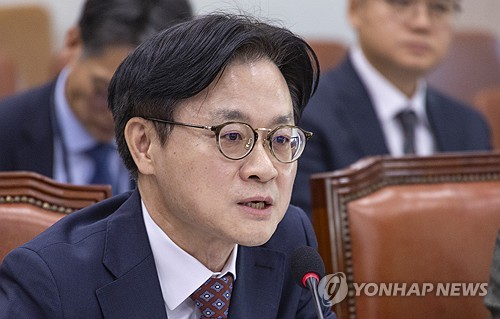(Seoul=Yonhap Infomax) Su Jin Yoo – South Korea’s Minister of Trade, Industry and Energy, Kim Jung-kwan, reaffirmed his opposition to the opposition party’s call for parliamentary ratification of the $350 billion US investment memorandum of understanding (MOU), emphasizing the need for ongoing revisions in line with national interests.
Kim stated, “From a national interest perspective, the MOU must be continually updated. I hope the negotiation team is given sufficient flexibility.” He reiterated that requiring parliamentary ratification could restrict South Korea’s ability to adapt, noting, “Neither the US nor Japan requires parliamentary ratification for such MOUs, and there is no related controversy in those countries.”

Appearing on KBS’s ‘Sunday Diagnosis Live’ on the morning of the 23rd, Kim explained, “If the MOU is ratified, it would be recognized as a treaty and acquire the force of domestic law. Should we later amend the MOU to better serve our national interests, it could be seen as a violation of existing law.”
He added, “If we attempt to revise it, the US could question why we are changing the law. We will fully consult with the National Assembly on their concerns and address them through special legislation, but I hope the negotiation team retains room to improve the MOU as needed.”
Kim also highlighted that multiple safeguards have been put in place to ensure South Korea is not disadvantaged in the selection of US investment projects. “The MOU limits investments to sectors the US is strategically targeting, such as shipbuilding, energy, semiconductors, batteries, and critical minerals. Project selection is also restricted to those with commercial viability,” he said.
He further explained, “Korean companies will have priority in project execution, and we will select the managers overseeing these projects.” This ensures safeguards at all three stages: project selection, operation, and management.
Kim stressed, “We have established mechanisms to dispel concerns that only high-risk investments will be made, potentially leading to losses. Operational priorities will also focus on risk management.”
He also argued that for the recently concluded Korea-US tariff negotiations to remain stable, practical trust and friendly relations between the two countries’ leaders are more important than parliamentary ratification. “Even with a legally binding free trade agreement (FTA) ratified by both countries, former President Trump did as he pleased. This suggests that the current agreement and MOU could be reversed at any time,” Kim said.
“Maintaining a friendly relationship and trust between the two countries’ leaders is more important for stability than the legal binding force of the MOU,” he concluded.
sjyoo@yna.co.kr
(End)
© Yonhap Infomax. All rights reserved. Unauthorized reproduction, redistribution, or AI training/use prohibited.
Copyright © Yonhap Infomax Unauthorized reproduction and redistribution prohibited.

